NEW YORK (AP) — Stores specializing in secondhand clothes, shoes, and accessories are anticipated to thrive amid the ongoing trade war initiated by President Donald Trump, as global businesses scramble to mitigate potential damage, industry experts suggest.
American fashion is significantly influenced by international trends, and nearly all clothing sold in the U.S. is produced abroad. A recent estimation by the Yale University Budget Lab highlighted that consumer prices for clothes could surge by 65% and for leather goods by 87% due to U.S. tariffs, which disproportionately impact these categories. Such increases may push cost-conscious consumers toward online resale platforms, consignment boutiques, and thrift stores in search of more affordable options or avenues to monetize their existing wardrobes. Used items are generally less expensive than new ones and would only incur tariffs if imported from outside the country.
"I think resale is going to grow in a market that is declining," stated Kristen Classi-Zummo, an apparel industry analyst at Circana. "In this chaotic environment, channels that provide value are likely to succeed." Nevertheless, the future of preowned fashion is uncertain, especially regarding the duration of the tariffs and their impact on consumer behavior. It remains unclear whether resale platforms will also raise their prices in alignment with the broader market fluctuations or consumers' changing demands.
A new audience driven by sticker shock is emerging. Jan Genovese, a retired fashion executive, sells her unwanted designer apparel through platforms like Mercari. While she currently doesn't feel driven to switch to high-end secondhand shopping channels, she acknowledges that rising retail prices might influence her decisions.
The secondhand clothing market was already experiencing substantial growth before tariffs complicated the U.S. fashion landscape. According to McKinsey and Co., global revenue from preowned fashion was predicted to expand 11 times faster than retail apparel sales by 2023 as shoppers sought more economical and environmentally friendly purchasing options.
Traditionally, millennials and Generation Z have been identified as primary buyers of used clothing, but as recent data from market research firm Sensor Tower indicates, the audience for secondhand items is broadening. The number of app downloads for nine tracked resale platforms—including eBay, OfferUp, Poshmark, Mercari, Craigslist, Depop, ThredUp, TheRealReal, and Vinted—rose by 3% within the first quarter of the year, marking the first quarterly growth in three years.
Classi-Zummo observed a shift in consumer behavior; shoppers are increasingly utilizing secondhand platforms to replace essential wardrobe items rather than just seeking unique vintage pieces, finding them more affordable even amid retailer discounts.
Poshmark's CEO, Manish Chandra, highlighted that while the platform has yet to witness a spike in sales linked to the tariff situation, they are prepared to leverage this moment. Changes in e-commerce technology, such as improved search functionalities at Poshmark, are seen as beneficial during market disruptions caused by tariffs.
Archive, a San Francisco-based tech firm facilitating resale programs for brands like Dr. Martens and The North Face, has noted heightened interest from brands eager to collaborate. CEO Emily Gittins emphasized the potential for tapping into the vast inventory already present in U.S. homes or unutilized stock, which could provide a revenue source as brands limit foreign orders.
Despite the optimism surrounding resale opportunities, vendors may face challenges related to tariff-induced shifts in the market. Rachel Kibbe, CEO of Circular Services Group, explained that U.S. sellers importing secondhand goods from the European Union could face a 20% duty if new tariffs are implemented. She leads a coalition advocating for tariff exemptions on used and recycled goods for resale purposes, following the elimination of duty-free provisions for low-value parcels from other countries.
The CEO of ThredUp, James Reinhart, mentioned that the potential tariff alterations, such as the removal of the "de minimis" provision along with significant duties on Chinese goods, could favor resale businesses like his. However, he does not anticipate a significant operational shift towards resale channels for individual brands.
Rebag, a marketplace for used designer handbags, plans to grow its customer base due to expected tariff impacts and aims to open more physical stores. CEO Charles Gorra is analyzing pricing strategies for new luxury goods in tandem with resale pricing—an approach he indicates might adapt as tariffs influence the market.
Norah Brotman, a 22-year-old senior at the University of Minnesota, primarily purchases clothing through eBay and thrift stores, reselling vintage items on Depop. She views potential tariff impacts on fast fashion as a positive outcome, encouraging a cultural shift away from mindless consumption towards more conscientious purchasing choices.











